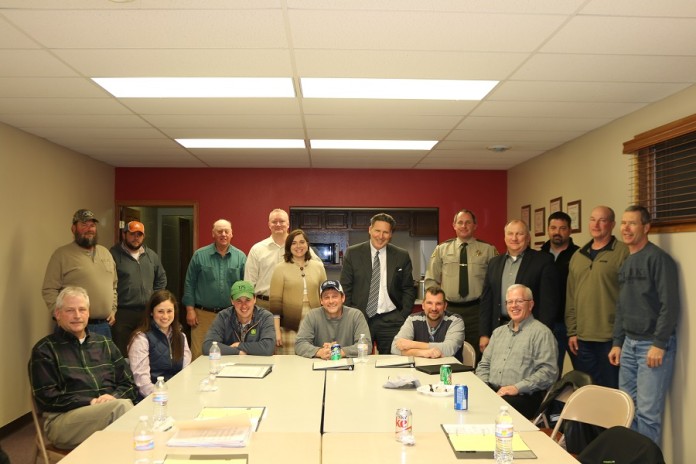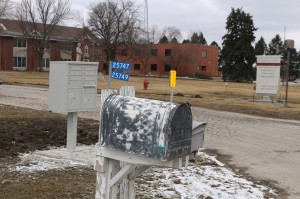
A dozen members of Dallas County Farm Bureau welcomed half-a-dozen leaders of Dallas County government Tuesday night to the annual supper and round-table discussion at the Farm Bureau offices in Adel.
The event lets county office holders listen and address the interests and concerns of local growers, and it brings Dallas County farmers up to date with the issues facing county government. Best of all, it gives everyone attending a chance to enjoy a delicious meal prepared by Farm Bureau Office Manager Janet Hick.
Facing the farmers over chicken and biscuits were Dallas County Supervisors Mark Hanson, Brad Golightly and Kim Chapman. They were flanked by Dallas County Precinct Election Coordinator Julia Helm, Dallas County Sheriff Chad Leonard and Dallas County Attorney Wayne Reisetter.
Dallas County Farm Bureau members attending were Kurt Keeran, Brian Fager, Bob Taylor, Clay Muller, Dan Golightly, Peter Wicks, Emily Webster, Jon McClure, Tom Stine and Rod Collins. Iowa Farm Bureau Federation Region 11 Manager Jeremy Coyle was also present. Coyle has managed the county Farm Bureau offices in Boone, Dallas, Greene, Polk and Story counties since 1997.
Grundy Center farmer Mark Buskohl of the Iowa Farm Bureau Federation Board of Directors also attended the meeting.
Dallas County’s need for a larger jail and more administrative space was the common theme of the officeholders’ reports. The county has doubled its population since 2000, growing from 40,000 to 80,000 residents, and the number is projected to double again by 2035. This fact is at the root of the perennial space problems.
Leonard reported on the county’s law enforcement efforts, with emphasis on the overcrowded Dallas County Jail. He said the cost of housing prisoners in surrounding county jails, such as the jails in Story, Guthrie and Polk counties, will exceed $250,000 this year, a price that does not include the cost of transporting the inmates.
Leonard also noted the state granted the county a five-year waiver for fixing its overcrowded jail in 2001 and has twice extended it. But the state has tired of waiting for the county to solve the problem, and the waiver will finally expire in 2017, reducing the number of beds in the Dallas County Jail from 36 to 24 and further compounding the crowding.
Reisetter noted the overcrowded jail puts public safety at greater risk because deputies who would otherwise be patrolling are pulled off the county roads in order to transport prisoners. The county attorney also described the “maturing of the county population,” which is seen in changing crime patterns.
Helm illustrated the administrative side of the county’s space crunch. She said she and fellow elections officers dash back and forth across Court Street in Adel as they try to tend to duties in the auditor’s office and also manage the training of precinct poll workers. Parking is a big problem.

Chapman also spoke about developments in the ongoing puzzle over office space. He said the county is seeking to purchase the building at 210 N. 10th St. in Adel, formerly occupied by the Iowa Department of Human Services (DHS).
The DHS has relocated to the Human Services Campus, the property at 25747 N Ave. about five miles north of Adel. The county wants to buy the office building formerly leased by the DHS in order to vacate several other office buildings it leases just off the square.
Golightly brought more cheerful news to the Farm Bureau round table, announcing the budget for fiscal year 2017 will hold the line on the levy rate even as property tax revenues rise by about 8 percent, from $20.8 million last year to $22.6 million in 2017.
Golightly also spoke about the rising cost to Dallas County of the state’s reorganization into multi-county regions of services for the mentally ill and intellectually disabled. The county’s fiscal year 2017 budget shows an increase of nearly 27 percent in this line.
The Farm Bureau members in turn had concerns to share and questions to ask. Dan Golightly, a commissioner on the Dallas County Soil and Water Conservation District and brother to the county supervisor, asked what effect the Republican gas tax hike has had on the county’s road use funds.
Supervisor Golightly solicited the opinions of the Farm Bureau members on the question whether the county should sign on to 28E agreements forming the Beaver Creek Watershed Management Authority (WMA) and Walnut Creek WMA. Both agreements are currently in limbo as the board of supervisors analyzes the costs and benefits of joining the flood-control and water-quality collectives, which their proponents describe as nearly powerless talking shops.
“I don’t like watershed management authorities to begin with,” said Farm Bureau member Peter Wicks, “because I see a real possibility of them being run by basically whacked-out environmentalists. Now I’m not saying that’s how they all are, but there’s a possibility of that, and that could cause some real problems for us as farmers.”
Wicks said it might be a good idea for the county to join the WMAs in order to ensure the interests of agriculture are represented.
“So we could be a voice of reason at the watershed discussions,” said Hanson, “a voice of moderation. ”
Clay Muller, a Dallas County farmer who has experience with the Walnut Creek WMA, said the group has reached out to growers in the watershed and shown a willingness to listen and learn about farmers’ concerns, though he conceded they are largely ignorant of farming.
With the question of water on the table, Buskohl, the Iowa Farm Bureau Federation Board member, took the opportunity to inform the group about the latest developments in the Des Moines Water Works lawsuit against three northwest Iowa counties and the drainage districts the counties oversee. Buskohl said the latest news is encouraging.
The water works lawsuit is now in the U.S. District Court for the Northern District of Iowa before Senior District Court Judge Mark Bennett, a Harkin nominee, Buskohl said. Bennett announced his retirement last year but has stayed on the bench in order to help Northern District Chief Judge Linda Reade with the district’s large caseload.

As an indication of the lawsuit’s high stakes, Buskohl noted that Sen. Chuck Grassley, chair of the Senate Judiciary Committee, braved criticism by railroading through the emergency appointment of Judge Leonard Strand of Sioux City as Bennett’s successor, leapfrogging numerous judicial vacancies of much longer standing around the country in order to seat a judge believed more sympathetic to agricultural interests than Bennett.
Between Strand’s appointment and Bennett’s recent referral of some legal points in the case to the Iowa Supreme Court, Buskohl said there was cause for new hope.
“Farmers all across the country are watching this case very closely,” he said.
















